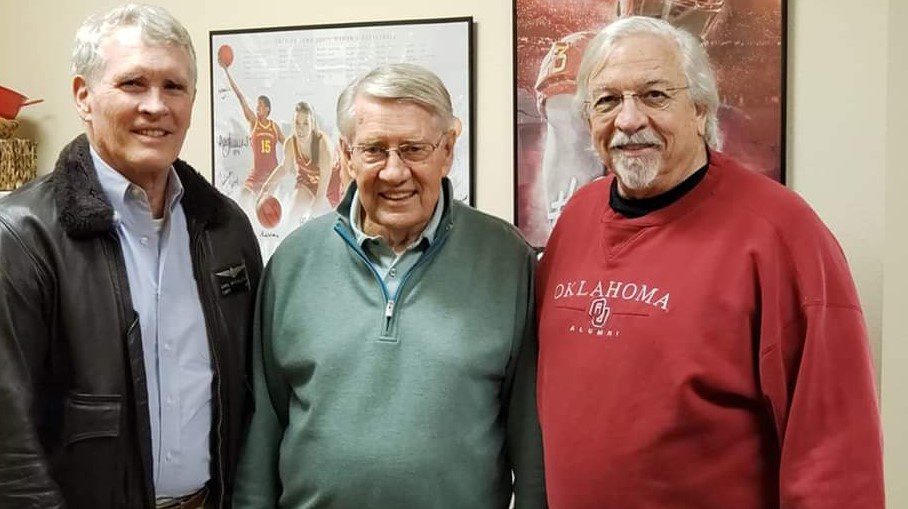Carl McCullough spent 24 years as a naval aviator and has worked in the FAA, the Pentagon and the White House. Now 77 years old and retired in Stallings, just outside of Charlotte, McCullough decided to try his hand at writing.
 McCullough’s first book, “Sid and the Boys: Playing Ball in the Face of Race and Big Business,” a real-life underdog story from his hometown in Oklahoma, was published earlier this month and has earned raves from Jay Bilas, Barry Switzer and Lon Kruger, among others.
McCullough’s first book, “Sid and the Boys: Playing Ball in the Face of Race and Big Business,” a real-life underdog story from his hometown in Oklahoma, was published earlier this month and has earned raves from Jay Bilas, Barry Switzer and Lon Kruger, among others.
Don’t expect this to be the start of a new career, however.
“This will be my only book, I think,” McCullough said.
The book was a labor of love, telling the story of the 1967 Bartlesville Wildcats, who upset their way to the state title while battling racism and the interference from the town’s main employer, Phillips Petroleum.
Phillips sponsored the nation’s top amateur basketball team — the Phillips 66ers — who won 11 AAU national championships and sent 12 players and two head coaches to the earliest Team USA Olympic basketball teams.
The company was headquartered in Bartlesville and its money helped raise the town’s standard of living, at least for the white residents.
“Phillips dominated the town and their leadership enjoyed undue influence in schools, particularly in coaching matters,” McCullough said. “They influenced moves, firings, etc., and they tried unsuccessfully to influence the team in my book.”
Among the “influence” Phillips exerted was to make sure that Bartlesville College High School’s athletic teams didn’t become too black.
“The school system’s athletic director was approached by Phillips’ leadership,” McCullough said. “It was pointed out to him that a black kid was running back all the kicks, and he needed to tell the coach to use a white player occasionally. He refused to get involved and was fired.”
Phillips was just as involved with the basketball team. Sid Burton was in his second year as head coach, and, when a 6-foot-3 player expected to be Bartlesville’s star went down with a broken leg in football season, the team was left with a lineup that averaged 5-foot-11. Phillips decided to give the young coach some help by “loaning” someone to help with coaching.
The players stood up for Burton, however, refusing the Phillips interference and requesting that the school board leave Burton as the sole coach for the squad.

The team featured two players — one black, one white — who highlighted the divide in the town. Scott Martin’s father was a few years away from becoming CEO of Phillips, while Ernie Jackson was one of 12 children who grew up in a home with no running water.
Martin went on to star at Oklahoma, winning the national award for best college player under 6-feet tall in 1972. Jackson would become a Rhodes scholar finalist at Notre Dame before graduating from Columbia Law School.
“You might guess that Scott and Ernie have far different memories of growing up in Bartlesville — and of Phillips Petroleum Company,” McCullough said.
McCullough and his wife both grew up in Bartlesville, and as he researched the most famous high school team from his hometown, the shadow of racism and the story of a group of kids and their coach standing up to the establishment showed that this was much more than the inspirational “Hoosiers” type story he set out to write.
“The story evolved from the feel-good story of an underdog team winning a state championship to the even more compelling story that it’s become,” he said.
It also caused McCullough to reevaluate his childhood and the town that spawned him.
Those Phillips 66ers stars and Olympians? “They were all-white!” he realized. “No white people in Bartlesville even noticed the inequities — that blacks couldn’t use the swimming pools, country clubs, lunch counters downtown, etc. You couldn’t have convinced me a year ago that there was racism where I grew up.”
Still, even without the social issues, the underdog story is a compelling one. Bartlesville put together a 24-2 regular season but entered the playoffs as an undersized long shot. The Wildcats advanced to the state championship game against Oklahoma City Douglass, a team of 6-foot-3 to 6-foot-7 stars, led by player of the year Amos Thomas.
Bartlesville fought back from a second-half deficit to tie the game late. Then, seldom-used “Moose” Larson got the ball with seconds left. Instead of passing back to leading scorer Martin, as expected, Larson put up the shot himself, knocking it down to wrap up an unlikely title.
McCullough pushed to get his book finished and in print as soon as possible.
“I wanted coach to read this,” McCullough said of Burton, who is now 89 years old. “Already we’ve lost his assistant coach and two of the 12 roster players. Time isn’t my friend.”
The result is a powerful story of unlikely triumph by an unlikely 77-year-old debut author.

